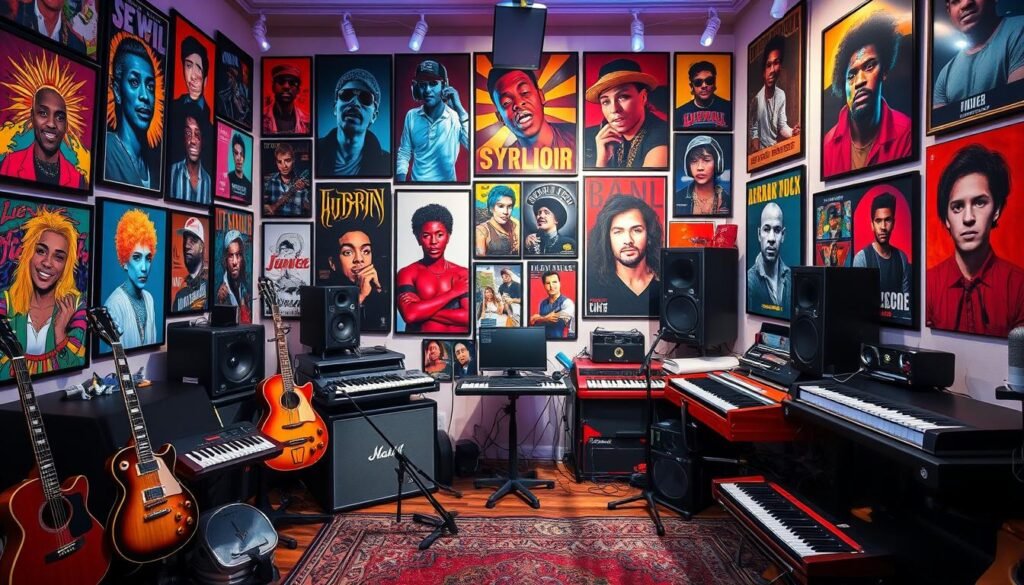Starting a Music Career Planning needs patience, hard work, and a readiness to listen to feedback. Today’s music world changes fast. It’s key to keep up with trends, make industry connections, and get real-world experience. Knowing what makes you special and being open to change are also crucial.
Also Read: How To Make Money With An Online Music Careers?
The music scene has changed a lot lately. Now, platforms like SoundCloud, YouTube, and Facebook’s Sound Collection help artists connect with fans. To succeed, you must keep learning, build strong relationships, and invest in yourself.
Key Takeaways:
- Stay informed about the evolving music industry landscape to identify emerging opportunities.
- Leverage networking and industry connections to build mutually beneficial relationships.
- Gain practical experience through internships and on-campus jobs to develop skills and industry insights.
- Identify your unique competitive advantage to stand out in the crowded music market.
- Cultivate an adaptable mindset to navigate the constantly changing music and entertainment industry.
Understanding the Modern Music Industry Landscape
The music industry has changed a lot in recent years. This change is thanks to digital distribution platforms and new industry trends. Now, artists can easily share their music and connect with fans. They also have new ways to make money.
Also Read: Top Music Career Tips For Beginners
Digital Distribution Platforms and Opportunities
Platforms like SoundCloud, YouTube, and Instagram have changed how artists share their music. These platforms let artists reach people all over the world. They can build fan communities and even go viral.
Smart artists use these platforms to show off their talents. They also connect with their listeners in new and exciting ways.
Current Industry Trends and Changes
More and more independent artists are making a name for themselves. They take charge of their music and business. Streaming services like Spotify and Apple Music have also changed how we listen to music.
Now, streaming is a big part of the music industry’s income.
Revenue Streams in Today’s Market
Artists need to find new ways to make money, not just from selling records. Live shows, selling merchandise, and licensing music are key. Artists who do well know how to use these different ways to make money.
| Platform | User Base |
|---|---|
| Spotify | 574 million users |
| Apple Music | 88 million users |
| TikTok | Nearly 200 million users growth from 2020 to 2021 |
The music industry today offers both chances and challenges for artists. By knowing about digital distribution, keeping up with industry trends, and finding different ways to make money, artists can succeed.
Also Read: Starting A Music Career: Essential Steps To Take
Music Career Planning: Building Your Foundation

Building a successful music career needs a mix of skills and knowledge. Aspiring artists must learn a lot and understand the music industry well. This is the first step to success.
Music education is key. You can learn through school or by yourself. Skills in music theory, production, and performance are vital. As the CEO/Founder of CCVM: Label w/o Walls with 30 years of experience in the industry underscores, commitment to your music career is key to success. Even getting signed at 40 years old can be possible with the right dedication and investment in your talent.
Creating a career plan is also important. You need to set goals and find ways to reach them. Look for places to perform and build a fan base.
Managing your career well is crucial. An Artist Development program with 6 modules for career growth can provide invaluable guidance and support, helping you build a strong personal brand and explore diverse revenue streams as an artist.
Music can help in career planning too. In Alberta, Canada, a course called “Career and Life Management” (CALM) uses music to improve skills. It helps students in math, reading, and thinking.
Teachers can use music to help students find their way. By sharing songs and learning about genres, students can discover more about themselves. Looking at the careers of musical heroes is also a good way to explore.
Building a strong music career takes many skills and knowledge. Whether you’re starting out or guiding students, music can be a powerful tool. It can lead to a rewarding and successful career.
Also Read: Exploring The Best Music Career Paths For Beginners
Developing Professional Skills and Expertise

To succeed in the music industry, you need more than just talent. You must also develop professional development, business skills, and performance techniques. This is key to thriving in the changing music world.
Mastering Your Craft
Practicing consistently and improving your skills are crucial. Seek advice from mentors or peers to grow. Regular practice keeps your skills sharp.
Business Acumen Development
Success in music goes beyond just playing. You need to understand contracts, royalties, and finances. Knowing the music industry well helps you make smart choices.
Performance Enhancement Strategies
Connecting with your audience through live performances is vital. Work on your stage presence and learn to engage with your audience. Improving your performance skills can make a big difference.
Combining professional development, business skills, and performance techniques with your music talent is essential. Always learning and striving for excellence will set you apart.
Also Read: How To Choose The Right Vocal Music Universities?
| Skill | Description | Importance |
|---|---|---|
| Musicianship | Mastering your instrument, vocal technique, and music theory | Foundational for any successful music career |
| Songwriting | Developing a strong catalog of original compositions | Crucial for establishing a unique artistic identity |
| Live Performance | Enhancing stage presence, audience engagement, and managing performance anxiety | Vital for connecting with fans and building a loyal following |
| Business Acumen | Understanding industry contracts, royalties, financial planning, and entrepreneurial skills | Essential for effectively managing and growing your music career |
“The music industry is a constant state of high intensity searching and delivering, rather than a comfortable plateau. Freelancers in music must possess self-management skills, maintain high professional standards, and exhibit entrepreneurial initiative in launching and leading projects.”
Creating a Strong Personal Brand Identity

In the competitive world of music, standing out is key to success. A strong personal brand can grab the attention of fans, industry pros, and collaborators. It’s about creating a unique image and message that shows your artistic vision and values.
Being consistent is vital for a recognizable brand. Your visual identity, messaging, and presence should match across all platforms. This makes your brand memorable and shows your authenticity and professionalism.
Image development is crucial for building your brand. Working with designers or brand strategists can refine your look and tell your artist story. A good logo, album artwork, and merchandise can make your image polished and professional.
Brand consistency isn’t about sticking to one look or message. It’s about keeping a clear identity while growing and evolving. Adapting your brand to show your artistic growth and industry changes keeps your image fresh.
“66% of musicians and artists feel the need to distinguish themselves from their competition by developing a personal brand.”
Investing in a strong personal brand can set you apart in the music industry. A well-crafted brand identity helps you connect with your audience, get gigs, and attract industry attention. Let your unique voice shine through with artist branding.
| Statistic | Percentage |
|---|---|
| Musicians who feel the need to distinguish themselves through personal branding | 66% |
| Artists who find that having a brand helps them define their career objectives more clearly | 80% |
| Musicians with a strong personal brand who experience increased motivation and inspiration | 75% |
| Musicians who cite that having a brand contributes to their spiritual and authentic connection with their music and audience | 45% |
| Musicians with a well-established brand who find it easier to attract their target audience efficiently | 70% |
These stats show how important artist branding is in music. By focusing on image development and consistency, musicians can stand out, connect with their audience, and reach their career goals more effectively.
Also Read: Exploring Music Career Options: Your Guide
Networking and Industry Relationships
Networking is key in the fast-paced music industry. It can lead to great collaborations, mentorship, and career growth. Musicians can connect with many industry pros online and in person. This includes producers, engineers, managers, publishers, and marketing experts.
Building Professional Connections
Using social media is a smart way to meet industry peers and fans. By following others, giving feedback, and sharing insights, you can find partners. Also, going to music events and conferences is a great way to meet people and grow your network.
Utilizing Social Media Effectively
Sites like Instagram, Twitter, and LinkedIn are crucial for musicians. They help market yourself, share your work, and connect with others. Keeping your online presence active and professional can attract new connections and opportunities.
Industry Events and Conferences
Events like SXSW and Midem are perfect for networking. Research the attendees to find the right people to meet. Prepare a good pitch and set clear goals to make the most of these events.
FAQs
Q: What are the first steps to start a music career?
A: To start a music career, it’s crucial to develop a strong action plan that includes identifying your unique artist brand, creating music regularly, and gaining insights into the music business. Utilizing music career resources and networking with industry professionals can also help you kickstart your journey.
Q: How can I effectively plan for my music career?
A: Planning for your music career involves creating a roadmap that outlines your long-term goals, such as releasing music videos, promoting your music on platforms like Spotify and Amazon Music, and establishing a marketing plan. It’s important to stay adaptable and revise your plan as you gain experience and insights.
Q: What role does social media play in a music career?
A: Social media platforms, especially TikTok, play a significant role in building your brand and promoting your music. Engaging with your audience and sharing content can help you gain visibility and connect with fans, which is essential for success in the music industry.
Q: How can I navigate the complexities of the music industry?
A: Navigating the complexities of the music industry requires understanding its various components, including copyright laws, booking agents, and music teachers. Utilizing music career resources and seeking advice from experienced professionals can provide valuable guidance as you build your career.
Q: What is an effective marketing plan for a music career?
A: An effective marketing plan for your music career should include strategies for promoting your music, leveraging social media, and engaging with your audience. It’s crucial to analyze your target market and utilize different platforms to reach them, ensuring a sustainable career in the music business.
Q: How can I create a unique artist brand?
A: To create a unique artist brand, focus on what sets you apart as a songwriter and performer. This includes developing a consistent visual style, crafting a compelling narrative around your music, and engaging with your audience through authentic storytelling. Your brand should reflect your personality and artistic vision.
Q: What resources are available for developing a career in music?
A: There are many music career resources available, including online courses, workshops, and mentorship programs. Additionally, platforms like Spotify and Amazon Music provide tools for distributing and promoting your music, while networking events can connect you with industry professionals.
Q: How important is it to have a long-term goal in a music career?
A: Having a long-term goal is essential for a successful career in music. It guides your actions and decisions, helping you stay focused and motivated as you navigate the ups and downs of the industry. Regularly revisiting and adjusting your goals can ensure you remain aligned with your artistic vision.
Q: What should I consider when making music videos?
A: When making music videos, consider the concept, visuals, and how they align with your brand and music. It’s crucial to create engaging content that resonates with your audience and enhances your music’s message. Collaborating with talented directors and videographers can help you produce high-quality videos.
Q: How can I promote my music effectively?
A: To promote your music effectively, utilize various platforms for distribution, such as Spotify and Amazon Music, and engage with your audience on social media. Creating a marketing plan that includes regular content updates, collaborations, and utilizing music career resources will enhance your visibility and reach.
Source Links
- https://www.berklee.edu/careers/essentialsofsuccess.html
- https://www.astridbaumgardner.com/blog-and-resources/blog/career-planning-for-music-entrepreneurs-tapping-into-vision-and-going-for-plan-a/
- https://caricole.com/music-career-self-management-101/
- https://news.miami.edu/uonline/stories/2023/09/how-to-become-music-producer.html
- https://www.careersinmusic.com/music-industry/
- https://www.careervillage.org/questions/793882/whats-the-first-step-for-starting-a-music-career
- https://www.linkedin.com/pulse/7-steps-building-successful-career-music-living-dream-cari-cole
- https://www.ncda.org/aws/NCDA/pt/sd/news_article/23169/_PARENT/CC_layout_details/false
- https://caricole.com/the-11-pillars-of-artist-development-every-emerging-music-artist-should-know/
- https://actinart.org/music/career-development-a-strategic-effort-or-wishful-thinking/
- https://www.astridbaumgardner.com/blog-and-resources/articles/personal-branding-for-musicians-and-artists-using-your-unique-gifts-to-connect-with-your-audience-sp-1016948968/
- https://www.icmp.ac.uk/blog/building-a-brand-a-music-artist-or-band
- https://caricole.com/5-strategies-to-improve-your-music-career-in-2025/
- https://splice.com/blog/networking-for-musicians/
- https://whisperroom.com/tips/how-musicians-can-network-effectively-to-secure-gigs-mentors-and-collaborations/
- https://promo.ly/how-to-use-networking-events-to-advance-your-musical-career/




